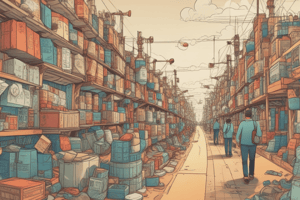Podcast
Questions and Answers
ما هو جوهر موضوع علم الاقتصاد؟
ما هو جوهر موضوع علم الاقتصاد؟
المشكلة الاقتصادية
تُعتبر مشكلة الندرة مشكلة ذات طابع محلي ولا تؤثر على جميع الأماكن.
تُعتبر مشكلة الندرة مشكلة ذات طابع محلي ولا تؤثر على جميع الأماكن.
False (B)
ما هي خصائص المشكلة الاقتصادية؟ (اختر أكثر من إجابة)
ما هي خصائص المشكلة الاقتصادية؟ (اختر أكثر من إجابة)
- العمومية (correct)
- مشكلة اختيار و تخصيص (correct)
- الندرة النسبية (correct)
- الديمومة (correct)
- التضحية (correct)
ما هو المقصود بـ "الحاجة مسألة نسبية"؟
ما هو المقصود بـ "الحاجة مسألة نسبية"؟
تُعتبر الحاجة إلى الماء حاجة لانهائية.
تُعتبر الحاجة إلى الماء حاجة لانهائية.
ما هو المقصود بـ "الحاجة قابلة للإحلال"؟
ما هو المقصود بـ "الحاجة قابلة للإحلال"؟
لا يمكن قياس الحاجة بوحدات الطول أو الوزن.
لا يمكن قياس الحاجة بوحدات الطول أو الوزن.
ما هو جوهر مشكلة اختيار وتخصيص الموارد؟
ما هو جوهر مشكلة اختيار وتخصيص الموارد؟
ما هو المقصود بالـ "التضحية" في سياق المشكلة الاقتصادية؟
ما هو المقصود بالـ "التضحية" في سياق المشكلة الاقتصادية؟
ما هي عناصر المشكلة الاقتصادية؟
ما هي عناصر المشكلة الاقتصادية؟
يُمكن اعتبار أي شيء يوفر منفعة موردًا اقتصاديًا.
يُمكن اعتبار أي شيء يوفر منفعة موردًا اقتصاديًا.
تُعتبر المعادن الموجودة في باطن الأرض موردًا اقتصاديًا حتى لو لم تكن متاحة للاستخدام.
تُعتبر المعادن الموجودة في باطن الأرض موردًا اقتصاديًا حتى لو لم تكن متاحة للاستخدام.
إذا كانت كمية مورد معين تكفي لإشباع جميع الحاجات إليه، فإنه يُعتبر موردًا غير اقتصاديًا.
إذا كانت كمية مورد معين تكفي لإشباع جميع الحاجات إليه، فإنه يُعتبر موردًا غير اقتصاديًا.
يمكن استخدام الأرض لإشباع أكثر من حاجة ، مما يجعلها موردًا غير متخصص.
يمكن استخدام الأرض لإشباع أكثر من حاجة ، مما يجعلها موردًا غير متخصص.
ما هي الفرق الأساسي بين السلع و الخدمات الاستهلاكية و الإنتاجية ؟
ما هي الفرق الأساسي بين السلع و الخدمات الاستهلاكية و الإنتاجية ؟
ما هي الفرق الأساسي بين السلع و الخدمات المتنافسة و المتكاملة ؟
ما هي الفرق الأساسي بين السلع و الخدمات المتنافسة و المتكاملة ؟
ما هي الفرق الأساسي بين السلع و الخدمات الضرورية و الكمالية ؟
ما هي الفرق الأساسي بين السلع و الخدمات الضرورية و الكمالية ؟
ما هي أسئلة المشكلة الاقتصادية الرئيسية التي يجب على النظام الاقتصادي الإجابة عليها؟ (اختر أكثر من إجابة)
ما هي أسئلة المشكلة الاقتصادية الرئيسية التي يجب على النظام الاقتصادي الإجابة عليها؟ (اختر أكثر من إجابة)
ما هو جوهر النظام الرأسمالي؟
ما هو جوهر النظام الرأسمالي؟
يعتمد النظام الاشتراكي على فكرة تدخل الدولة في النشاط الاقتصادي بشكل كبير.
يعتمد النظام الاشتراكي على فكرة تدخل الدولة في النشاط الاقتصادي بشكل كبير.
ما هو جوهر النظام الاقتصادي المختلط ؟
ما هو جوهر النظام الاقتصادي المختلط ؟
ما هو جوهر أسلوب حل المشكلة الاقتصادية في النظام الاشتراكي ؟
ما هو جوهر أسلوب حل المشكلة الاقتصادية في النظام الاشتراكي ؟
ما هو جوهر أسلوب حل المشكلة الاقتصادية في النظام الاقتصادي المختلط ؟
ما هو جوهر أسلوب حل المشكلة الاقتصادية في النظام الاقتصادي المختلط ؟
تُعتبر أغلب الدول في العالم اليوم تعمل ب نظام اقتصادي مختلط .
تُعتبر أغلب الدول في العالم اليوم تعمل ب نظام اقتصادي مختلط .
Flashcards
ما هي المشكلة االقتصادية؟
ما هي المشكلة االقتصادية؟
المشكلة االقتصادية هي مشكلة ندرة الموارد االقتصادية التي تلبي الاحتياجات البشرية.
ما هي الحاجة؟
ما هي الحاجة؟
تُعرف الحاجة على أنّها الرغبة الملحة للحصول على شيء يلبي احتياجًا معينًا.
ما هي خصائص الحاجة؟
ما هي خصائص الحاجة؟
الحاجات الشخصية تختلف من شخص لآخر، ومن زمان لآخر، ومن مكان لآخر.
ما هي الحاجة النهائية؟
ما هي الحاجة النهائية؟
Signup and view all the flashcards
ما هي الحاجة المتكاملة؟
ما هي الحاجة المتكاملة؟
Signup and view all the flashcards
ما هي الحاجة القابلة لإلحالل؟
ما هي الحاجة القابلة لإلحالل؟
Signup and view all the flashcards
ما هي الحاجة القابلة للمقارنة؟
ما هي الحاجة القابلة للمقارنة؟
Signup and view all the flashcards
ما هي أسباب تزايد الحاجات؟
ما هي أسباب تزايد الحاجات؟
Signup and view all the flashcards
ما هي الموارد؟
ما هي الموارد؟
Signup and view all the flashcards
ما هي الموارد الحرة؟
ما هي الموارد الحرة؟
Signup and view all the flashcards
ما هي الموارد االقتصادية؟
ما هي الموارد االقتصادية؟
Signup and view all the flashcards
ما هي خصائص الموارد االقتصادية؟
ما هي خصائص الموارد االقتصادية؟
Signup and view all the flashcards
ما هي السلع و الخدمات االستهالكية؟
ما هي السلع و الخدمات االستهالكية؟
Signup and view all the flashcards
ما هي السلع و الخدمات اإلنتاجية؟
ما هي السلع و الخدمات اإلنتاجية؟
Signup and view all the flashcards
ما هي السلع و الخدمات المتنافسة؟
ما هي السلع و الخدمات المتنافسة؟
Signup and view all the flashcards
ما هي السلع و الخدمات المتكاملة؟
ما هي السلع و الخدمات المتكاملة؟
Signup and view all the flashcards
ما هي السلع و الخدمات الضرورية؟
ما هي السلع و الخدمات الضرورية؟
Signup and view all the flashcards
ما هي السلع و الخدمات الكمالية؟
ما هي السلع و الخدمات الكمالية؟
Signup and view all the flashcards
ما هو دور علم االقتصاد في حل المشكلة االقتصادية؟
ما هو دور علم االقتصاد في حل المشكلة االقتصادية؟
Signup and view all the flashcards
ماذا ننتج؟
ماذا ننتج؟
Signup and view all the flashcards
كيف ننتج؟
كيف ننتج؟
Signup and view all the flashcards
لمن ننتج؟
لمن ننتج؟
Signup and view all the flashcards
ما هو النظام الرأسمالي؟
ما هو النظام الرأسمالي؟
Signup and view all the flashcards
ما هو النظام االشتراكي؟
ما هو النظام االشتراكي؟
Signup and view all the flashcards
ما هو النظام االقتصادي المختلط؟
ما هو النظام االقتصادي المختلط؟
Signup and view all the flashcards
كيف تُحل المشكلة االقتصادية في النظام االقتصادي المختلط؟
كيف تُحل المشكلة االقتصادية في النظام االقتصادي المختلط؟
Signup and view all the flashcards
Study Notes
The Economic Problem
- The economic problem, sometimes called the problem of scarcity, is the core of economics.
- It arises from limited economic resources and their relative scarcity compared to the growing human needs.
- This problem has faced humans and societies since time immemorial, and various economic systems have struggled with it, constantly seeking a balance between the multiplicity of needs and the scarcity of resources.
Understanding the Economic Problem
- The economic problem lies in the relative scarcity of available economic resources of all types and sizes necessary to satisfy human needs, which are diverse and constantly evolving.
- Due to limited resources, individuals and societies must make choices and trade-offs, sacrificing some needs for others.
Characteristics of the Economic Problem
- Universality: It affects all places and is not exclusive to any one location or time period.
- Persistence: It applies to all eras and times.
- Relative Scarcity: Resources are limited but have multiple and alternative uses, necessitating choices and sacrifices.
- Choice and Allocation: The limited resources and unlimited needs create a constant need to choose and allocate resources.
- Sacrifice: Since needs often exceed resources and resources have alternative uses, individuals or societies must sacrifice some needs to satisfy others. This involves comparing and prioritizing needs.
Elements/Determinants of the Economic Problem
- Human Needs: Needs are desires for specific things (utilities). e.g., food. These needs are:
- Relative: Varying from person to person, time periods, and locations.
- Unlimited: Recurring and constantly needing fulfillment.
- Interrelated: Some needs are interdependent, and fulfilling one needs fulfilling others.
- Substitutable: One need can sometimes be substituted for another.
- Unquantifiable but comparable: Needs can be compared, and priorities assigned, though not quantifiable in units of length or weight.
- Economic Resources (Factors of Production): These are anything useful, be it goods or services.
- Unlimited: They are always potentially available to satisfy some human need or desire.
- Scarce: The available amount is not always enough to cater for all needs.
- Free goods: Have no monetary value as they are readily available (e.g., air, sunlight, water, in their natural forms).
- Economic Goods: Possess value, requiring costs to produce.
- Characteristics: Useful, usable, scarce, general-purpose, easily usable for creating other goods.
Classification of Economic Resources
- Consumer goods and services: Direct satisfaction (e.g., food, clothing, dental care).
- Producer goods and services: Enable creating other goods or services.
- Competitive (substitute) and complementary: Substitute goods can replace each other in fulfilling a specific need. Complementary goods are needed together.
- Essential and non-essential: Essential goods are vital to survival and basic needs; non-essential goods increase comfort and enjoyment. The distinction is relative.
Pillars of the Economic Problem
- What to produce?: Scarcity necessitates prioritizing some needs over others, leading to specific goods and services production choices.
- How to produce?: Selecting the most efficient production methods utilizing resources effectively to maximize output.
- For whom to produce?: Distribution of produced goods among deserving recipients or to satisfy needs while ensuring fairness.
Economic Systems' Solutions
- Capitalist System: Emphasizes private ownership, economic freedom, individual gain, and competition. Price theory dictates production and consumption choices.
- Socialist System: Advocates for government intervention, focusing on common good and minimizing wealth concentration, with central planning determining what, how, and for whom to produce.
- Mixed Economy: Combines elements of both of the above systems, offering a balance between individual initiatives and government intervention. Utilizes market mechanisms while including governmental controls.
Studying That Suits You
Use AI to generate personalized quizzes and flashcards to suit your learning preferences.




